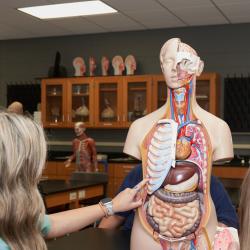(*please note that the accepted numbers below are estimates and subject to change)
- Advanced Emergency Medical Technician - 24 (certificate)
- Advanced and Entry Pharmacy Technician – 25 (certificate)
- Computer Tomography – 25 (Advanced Certificate)
- Dental Assisting – 36 (certificate)
- Dental Hygiene – 24
- Emergency Medical Technician – 84 (certificate)
- Health Information Management – 20
- Health Science – unlimited
- Magnetic Resonance Imaging (MRI) – 40 (Advanced Certificate)
- Mammography – 25 (Advanced Certificate)
- Nuclear Medicine Technology – 20 (offered as both an AAS and Advanced Certificate)
- Paramedic – 24 (certificate)
- Physical Therapist Assistant – 24
- Radiation Therapy – 20 (Advanced Certificate)
- Radiologic Technology – 32
- Registered Nursing – Day Main Campus 110, Day Kimball campus 15, Night 50, Transition 24
- Respiratory Care – 25
- Sonography – 25 (Advanced Certificate)
- Surgical Technology 24 students
- Veterinary Technology - 24
If you are not a current student at Chattanooga State, please complete a College application online and complete all admission requirements. Once admitted to the college, you will be assigned an Academic Advisor who will help create your Academic Plan.
Each program has an application checklist that will guide you regarding when and what information is required. Attending an information session will also help answer questions regarding the application process, requirements, TEAS and point calculations.
Yes, however, each program has different requirements so follow the application checklist carefully.
Each program has different general education course requirements. In some programs, all general education courses must be complete prior to starting the program. Likewise, some programs give points for courses completed, but not all have to be complete to apply. Attending a program information session will help clarify a specific program point calculation process.
Program selection is a competitive process based on an objective point system. Points are awarded based on completion of general education courses, grades awarded in those specific courses, TEAS test results, and/or any other materials that may be required for specific programs. Attending a program information session will help clarify a specific program point calculation process.
There isn’t an exact number of points needed to be accepted. The applicant pool is filtered according to total points and ranked accordingly. Students scoring the highest number of points are considered for the program. Attending a program information session will help clarify the details.
- Advanced Pharmacy Technician (strongly encouraged)
- Dental Assisting (required)
- Dental Hygiene (required)
- Emergency Medical Technician/AEMT (required)
- Health Information Management (required)
- Nuclear Medicine Technology (required)
- Physical Therapist Assistant (required)
- Radiation Therapy (required)
- Radiologic Technology (required)
- Registered Nursing (strongly encouraged)
- Respiratory Care (required)
- Sonography (strongly encouraged)
- Veterinary Technology (strongly encouraged)
- Dental Hygiene
- Physical Therapist Assistant
- Radiologic Technology
- Registered Nursing
- Respiratory Care
- Advanced Emergency Medical Technician - July 31st (Fall) and January 15th (Spring)
- Advanced and Entry Pharmacy Technician – rolling admission
- Computer Tomography – June 1st (priority deadline)
- Dental Assisting – June 15th
- Dental Hygiene – First Monday in February
- Emergency Medical Technician – July 31st (Fall) and January 15th (Spring)
- Health Information Management – May 1st
- Magnetic Resonance Imaging (MRI) – June 1st (priority deadline)
- Mammography – June 1st (priority deadline)
- Nuclear Medicine Technology – March 1st
- Paramedic – June 30th
- Physical Therapist Assistant – First Monday in March
- Radiation Therapy – April 1st
- Radiologic Technology – May 1st
- Registered Nursing – March 1st (Day/Night) and January 15th (Transition)
- Respiratory Care – May 15th
- Sonography – March 15th
- Surgical Technology - November 15th
- Veterinary Technology – November 1st
- Advanced Emergency Medical Technician - 1 semester
- Advanced Pharmacy Technician – 2 semesters
- Computer Tomography – 1 semester
- Dental Assisting – 3 semesters
- Dental Hygiene – 5 semesters
- Emergency Medical Technician – 1 semester
- Entry Level Pharmacy Technician – 1 semester
- Health Information Management – 4 semesters
- Magnetic Resonance Imaging (MRI) – 1 semester
- Mammography – 1 semester
- Nuclear Medicine Technology – 4 semesters (AAS), 3 semesters (certificate)
- Paramedic – 3 semesters
- Physical Therapist Assistant – 4 semesters
- Radiation Therapy – 3 semesters
- Radiologic Technology – 5 semesters
- Registered Nursing – 4 semesters (Day), 5 semesters (Night), 3 semesters (Transition)
- Respiratory Care – 5 semesters
- Sonography – 3 semesters
- Surgical Technology - 4 semesters
- Veterinary Technology – 4 semesters
While working is certainly a possibility, students who work 20 hours per week or less are generally most successful.
- Advanced and Entry Pharmacy Technician
- Dental Assisting
- Dental Hygiene
- Health Information Management
- Nuclear Medicine Technology
- Paramedic
- Physical Therapist Assistant
- Radiation Therapy
- Radiologic Technology
- Dental Assisting
- Dental Hygiene
- Nuclear Medicine
- Physical Therapist Assistant
- Radiation Therapy
- Radiologic Technology (extra credit)
- Sonography
The Division of Nursing & Allied Health complies with Section 504 of the Americans with Disability Act (1990). Visit Disability Services for more information.



